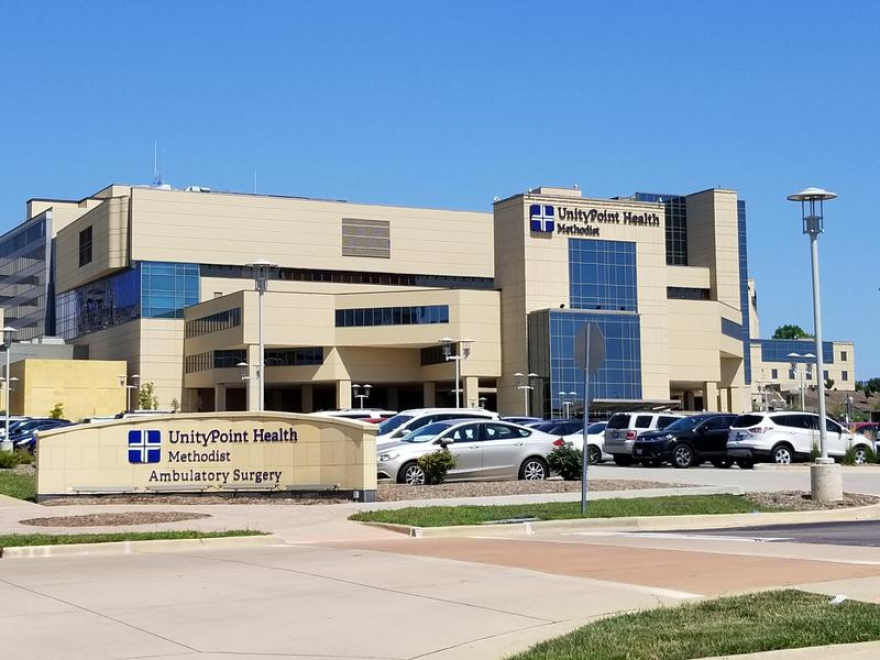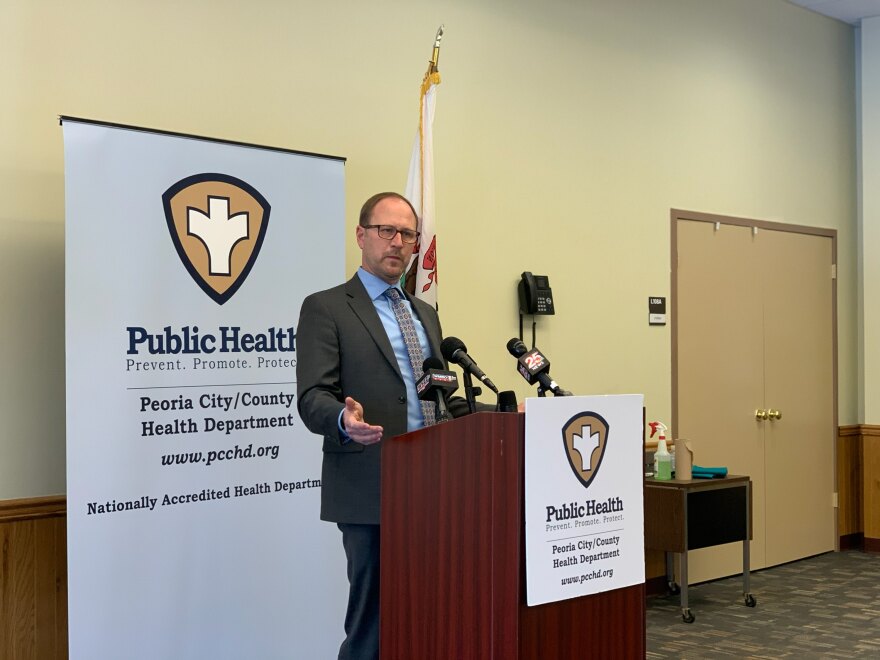_
As the omicron variant sweeps Peoria amid an ongoing shortage of health care workers, UnityPoint Health Central Illinois and OSF Healthcare hospitals are once again overwhelmed by COVID-19.
Only 11 percent of Peoria County's ICU beds were available as of Thursday.
That statistic doesn't convey how dire the situation truly is, said Dr. Keith Knepp, the regional president and CEO of UnityPoint Health Central Illinois.
"That may be the number of beds that are available, but we don't have that those beds staffed," he said. "So our ICUs are full today. And in order for us to accept more patients, we'll have to find staff that can take care of those patients. And since there aren't any more staff and there aren't more travelers available, we will ask the existing staff to do more."
Knepp described current conditions as "the worst that we've seen" throughout the entire COVID-19 pandemic.
"We have the highest number of patients and our three UnityPoint Health Central Illinois hospitals," he said. "We have broken triple digits for the first time in the last week. For the first time since the pandemic started, we've had over 100 patients hospitalized between our three hospitals."
The average ICU stay before the pandemic was 3-4 days. Now, for a COVID-19 patient, it is 8-12 days. At both UnityPoint and OSF, the majority of patients hospitalized with COVID-19 are unvaccinated.
Both UnityPoint and OSF have postponed elective, non-emergency surgeries and procedures to open up additional ICU beds.
UnityPoint also is pulling staff from its urgent care clinics to bolster staffing inside Methodist, Proctor and Pekin hospitals, Knepp said. Many employees are out sick with COVID-19 themselves.
"Everybody's tired," Knepp said. "Everybody's already working hard. So there's really an intense amount of stress on the teams that are caring for these patients."
OSF Healthcare president Bob Anderson said staff morale is low.
“We are tired,” he said. “We have seen a solution come in the form of the vaccine, only to find that, you know, it's not being fully accepted, which has continued to create these challenges for us.”

He echoed Knepp in likening ICU capacity to March of 2020. However, the problem at the start of the pandemic was a lack of personal protection equipment (PPE) and ventilators.
Now hospitals are equipped — but they are short of staff.
Some OSF workers have opted for travel gigs that offer higher pay, Anderson said. Others are retiring early—– or leaving the field altogether.
“You know, we've all heard about, ‘The Great Resignation,’ and how many people have left the workforce in the past few months … health care is not immune to that,” he said. “Our big challenge is trying to take care of all these people, more than ever before, with fewer staff than we had.”
Peoria City-County Health Department Administrator Monica Hendrickson said that until the majority of Peorians reach immunity to COVID-19 through vaccination, the "hamster wheel" of the cases falling, then surging, then falling again may continue indefinitely.
"This might extend on for a long period of time," she said. "We're gonna still see this tsunami of cases, we're gonna still see the capacity issues in our health care system."
UnityPoint vice president and chief medical officer Dr. Samer Sader said he wants to fight the misinformation that most of the county's current COVID-19 patients are people who come to hospitals for other reasons — and happen to test positive for the virus once hospitalized.

"I can tell you, 90%-plus are in the hospital because of COVID illness," he said. "Over half of our intensive care unit is COVID-related complications. So ... whatever you're hearing out there ... that (there is) the rare person who tests positive, who's there for something else. ... That is not what's straining our resources."
Knepp urged Peorians who have not already done so, to get vaccinated — and to continue wearing masks indoors and practice social distancing.
"We're not here to spread fear," he said. "We're not here to cause anger, we're not here to point fingers, we absolutely don't want to cause shame. But we do want to ask for action."
He continued, "The best thing we can do as a community, for our own sakes, for the sake of our health care workers, is to get vaccinated, and if we're vaccinated, to get boosted. And to wear masks ... We just plead with everybody to do both of those things. It will make a difference."

By the numbers
Tri-County officials reported 14 more fatalities linked to the pandemic on Thursday, after adding to 11 deaths on Wednesday. Twenty of those deaths over the past two days are from Peoria County.
The area's death toll since the start of the pandemic stood at 959 as of Thursday.
Tri-County health departments reported 859 new cases between Wednesday and Thursday. As of Thursday, more than 5,131 COVID-positive residents were isolating at home.
These figures only account for cases reported through lab testing; people who are using at-home testing kits are not included in the data.
Peoria County reported 78 individuals hospitalized with COVID-19 on Thursday, up from 51 the day before after dropping from 106 on Tuesday.
Again, the majority of those hospitalized are unvaccinated, said health officials.
How to get vaccinated, boosted, tested
Any Peoria resident over the age of 5 can receive a coronavirus vaccination through their health department. Anyone over the age of 18 who is at least six months post-full vaccination is eligible to receive a booster shot.
Thanks to new state funds, the health department is expanding its walk-in vaccination clinic hours to include weekends. Learn more here.
Illinois residents can receive free COVID-19 testing at the Peoria Civic Center parking lot from 8 a.m.-4 p.m. Mondays, Wednesdays, Fridays and Saturdays.
These are PCR tests, meaning they have the ability to detect the genome sequencing of variants.
For more information on testing and vaccinations, visit the Peoria City-County Health Department's website.
Those who need a letter stating their testing or vaccination status before returning to work or school should call 312-777-1999.
Learn more: free COVID-19 testing at Peoria Civic Center
Reporting from Joe Deacon contributed to this story.


